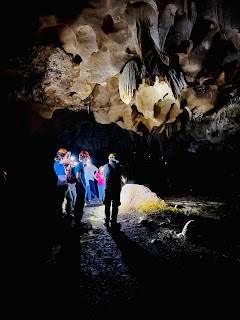Welcome to our program blog!
It's been out of commission for a few years, but we're back, keeping you updated on the goings and doings of our current immersion program. Students from College of the Atlantic in Bar Harbor, Maine, U.S.A have begun their program, becoming immersed in Yucatecan culture for 3 months!
The past two years have been full of challenges and changes, so this year's program will be a little different as we focus on the health and safety of our program participants and the local people and communities that they will come into contact with. Let's get started!
On the way to our first destination, the coast of Yucatan, after a few technical problems it was smooth sailing toward the Gulf of Mexico!
Do you know how to sleep in a hammock? Our students are now experts, and what could be better than enjoying the stars, the ocean breeze, the sand and a couple rain drops…
A promising dawn as we wake up in a community of fishermen, our local guides talk to us about the mangroves, the birds, crocodiles and their lives. And our experience wouldn’t be complete without enjoying a meal prepared by Doña Zoila, a marvelous woman who experiments with the flavors of the sea and shares her delicious inventions with us.
If anyone was missing the snow, we have a tropical version; sea foam! The result of dancing waves in the land of pink waters and flamingos.
Raul, our resident anthropologist, shared important information about the community and its history. Our students break into small groups to talk about their perspectives and to explore more about this topic.
Who wants some atole nuevo? It’s a drink made from ground fresh corn and served either sweet or salty. Without a doubt it filled our students with lots of energy to start their day!
Raul and Don Francisco cleared a path to the underworld…and along the way Don Felix and his son Aaron taught us about different kinds of medicinal plants and we even came across faint paw prints left by a jaguar!
Pictures can’t possibly do justice to the incredible views, the sounds of total silence broken only by the sounds of one and then one hundred stalactites dripping at the same time, or the mystery and awesomeness that we felt underground, experiencing xibalbá.
It’s always amazing to come across evidence left underground by our ancestors, like the cave paintings we were able to see.
Thanks to handmade tortillas and beans made by Doña Dora, we were able to recover our strength and continue our journey.
We also learned about the lives of bees, especially some species of bees native to the peninsula. We were even able to taste different kinds of honey and other honey products.
It's been a great start to the program, keep an eye on this blog to see what our students get to experience next!
















